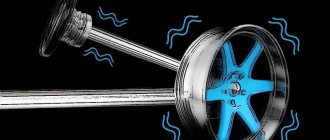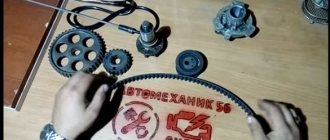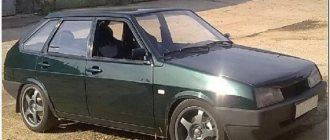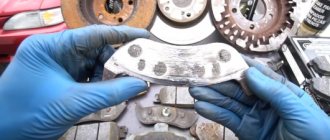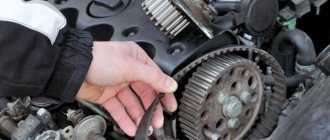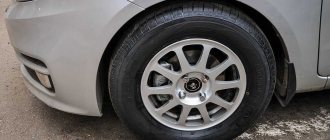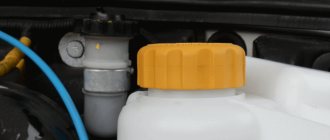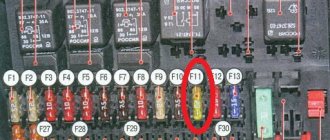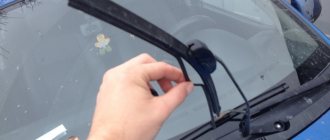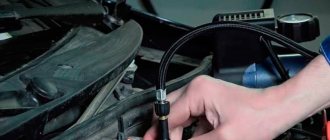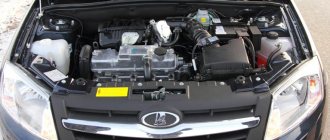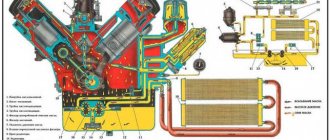22.07.2019
| (Votes: 2, Rating: 5) |
Issues discussed in the material:
- Why do the pads squeak when braking?
- How to determine pad wear
- What to do if the pads squeak when braking
- Which pads to choose for replacement
Drivers who have recently replaced their brake pads are often faced with the problem of squeaky brakes. The same problem occurs when the car is used particularly intensively. The creaking can persist for a long time without affecting the operation of automotive components in any way. We will discuss in our article why the elements of the brake system creak when braking and how to eliminate this creak.
Eliminating squeaking brake pads.
Can't cope with the terrible whistle or squeaking of brake pads? Or maybe you are annoyed by the terrible sound when braking and you don’t know what to do about it? Have you just, very recently, changed your brake pads, but as a result of this, an unpleasant squeak or whistle appeared when braking? Don’t be upset, friends, in fact, you can fix everything yourself.
Before moving directly to the description of a method that will help you get rid of squeaking brakes, we would like to note the following that not a single auto mechanic will help you make a completely silent brake system. In either case, when you press the brake pedal hard, you will hear a certain squealing sound from the brake pads or brake drums. However, in most cases, it is still possible to get rid of an unpleasant squeak or whistle in this mechanism. You can read more.
Manufacturing defects
There is an unspoken rule: the smaller and more unknown the manufacturer’s brand, the greater the likelihood of purchasing a defective product. Only at large factories of well-known manufacturers there is control over product quality and the ability to make the necessary changes to production technology.
Small brands don’t care about quality; the main thing for them is to sell all their products without rejecting products with defects. When purchasing, you always have the opportunity to inspect the parts, study the instructions and the availability of safety and quality certificates.
What causes your brakes to squeal?
Modern brakes consist of metal brake discs that are sandwiched between two pads coated with a friction material. When the discs, caliper and brake pads are or are in perfect condition, the entire system works properly and when you press the brake hard, you will not hear any unpleasant squealing sound. Yes, we do not argue that when braking sharply, any driver hears the squealing of the brake system, but it will remind them more of the sound of a correctly tuned violin than the same playing of a Scottish bagpipe by a non-professional.
Just as for the normal sound of all musical instruments, a tuner is needed, so for the normal adjustment of the brake system, you need a specific professional auto mechanic who, in the event of a brake malfunction, will be able to adjust the brake system of your car to optimal operation.
Material quality
Some motorists, wanting to save money, purchase cheap and low-quality products from waste raw materials. Usually these are either fakes of original products or pads from unknown Chinese manufacturers.
Friction materials for pads must be soft enough to lightly grind the disc while maintaining the desired friction area. On the other hand, they must have the necessary strength and resistance to elevated temperatures so as not to collapse during operation.
Each manufacturer has its own patented pad formulation, consisting of dozens of fillers, additives, abrasives, and binding components.
Cheap asbestos pads for city cars have been replaced by organic ones - filled with graphite and aldehyde polymers. The operating temperature is low - 4000C. Their peculiarity is that they must warm up during the first 100 km, otherwise there is a risk of not only excessive noise, but also destruction.
More stable metal and semi-metallic pads combine the strength of metals (steel, cast iron) and synthetics. If a cast iron block lasts an average of 1 year without complaints, then cermets can be left unchanged for up to 6 - 8 years, of course, with careful use and care.
It has been proven that friction materials with brass and steel coarse inclusions are more likely to wear out discs than fine-grained aluminum and copper additives.
Normal brake noises
Many brake pads squeal or squeak, which usually occurs during the first few braking sessions after the vehicle has been parked overnight. As a rule, this squeak goes away after the brake pads heat up and do not expel the moisture that has accumulated in them overnight.
Dear friends, you have probably encountered grinding brake pads, especially in rainy and damp weather in the morning? Don't be alarmed, this is normal, because a thin layer of rust has formed on the brake discs overnight due to the moisture they contain.
Previously, asbestos was used as a friction material on pads. Fortunately, as a result of research, doctors have proven that asbestos can cause lung cancer and therefore they decided to completely abandon the use of this material to cover brake pads.
Currently, alternative types of materials that are less hazardous to human health are used as friction materials. For example, in recent years, the use of a combination of metal and ceramics as a coating for pads has become increasingly popular. This is primarily due to the fact that in recent years the global automotive industry has been developing towards reducing the weight of all vehicle components. Therefore, reducing the weight of the braking system is an important task for all automobile companies.
But due to the use of these new friction coatings, when braking a car, an unpleasant creaking (squealing) etc. may appear. in the brakes. This is a very small price to pay for increasing the power of modern cars, which occurs due to the lightening of all parts of the vehicle.
Also, do not confuse the standard squeak of brake pads with the squeak when they (these pads) have reached 80% of their wear. Let us remind our readers that most brake pads begin to squeak at the moment when the friction layer on them is almost worn out. This is done so that the owner of the car, without any diagnostics, can basically find out that it is time to replace the old pads with new ones.
What to do to make new brakes stop squeaking when braking the car at low speed
Actually, if nothing was done before the grinding noise appeared, then this is a call to at least inspect the area around the calipers. Where to look has already been discussed; these cases do not require additional comments. An interesting list of actions in relation to fresh pads, which after installation began to squeak. Replacement immediately is not an option, this is a last resort method.
Lapping in
Give the friction linings time to grind in. After several hundred kilometers of city travel, their working surface will be in full contact with the disk, and this is a reason to stop the whistling, but not the only one.
In relation to pads, the term “molting” is relevant. The fact is that the product includes organic products of the oil refining industry - resins. Overheating, the latter turn into gas, and a gas gasket appears between the friction part and the disk. The effect is similar to hydroplaning of car wheels.
High-quality products undergo “molting” once or twice and only when heated. “When cold,” they do not creak, unlike low-grade models. By the way, the latter's burn-in knows no limits - they will squeak all the time.
Sports pads have their own specifics. If you do not burn through, the brakes on the car will constantly whistle even when braking at low speed. Baking consists of several series of accelerations and decelerations with breaks. The main goal is to overheat the pads to the point where there is smoke in the area of the wheels:
- Stops smoothly from 60 km/h to 0 km/h. Repeat 5 times.
- Drive 1 km without braking.
- Slow down from 80 km/h to 0 km/h. Do it 5 times.
- Drive 2 km without stopping.
- Perform steps 1-4 again.
- Cool the brakes during 5-10 km of non-stop driving.
Lubricate
Never use a work surface! It is necessary to lubricate those areas that are adjacent to the bracket and the surfaces of the caliper. This will help avoid additional vibrations, because not only the friction layer can squeak.
Do not use just anything, but use copper anti-squeak paste (for example, Mannol Kupfer-Paste or Liqui Moly Kupfer-Paste). It does not dry out at high temperatures and is suitable for the prevention of guide supports.
Before installing new pads, it is appropriate to inspect the contact surfaces of the bracket. If there are burrs and wear on them, smooth them out with a needle file. And don’t forget about the caliper guides - they also need lubrication and periodic replacement. By the way, their wear is recorded as the cause of knocking when turning the steering wheel at low speed.
How to reduce squealing brake pads?
One of the most effective ways to get rid of squeaking or whistling when braking is to change the pads to others that use a different friction material. True, as many people know, it will be problematic and difficult to purchase non-original pads that will match and therefore work better than the original pads, but, nevertheless, this is possible today.
Please remember that the more expensive the pads, the more expensive their friction coating, on which their successful operation depends, that is, whether an extraneous sound will appear during braking or not.
Also, you can reduce the squeaking or whistling of brakes when braking in another way, namely, by lubricating the pads with a special compound(s). Dear friends, we do not recommend that you use for this purpose various oil compounds and WD-40 with them, which are used to reduce the friction of the friction coating of the pads with the brake disc, since all this can affect the effectiveness of the braking itself, which will certainly reduce your own safety.
In addition, before installing non-original pads, you can first remove all the metal burrs that are on the pads using sandpaper, and then paint all the ends with fire-resistant paint. This way you can achieve a reduction in excess gaps between the friction coating and the surface of the brake disc.
In particular, before directly installing the pads into the caliper, lubricate the guides themselves with graphite lubricant.
If, after preparing the pads and lubricating the guides in the caliper, the squeaking of the pads has not disappeared and still continues to torment you on the road, then please check the brake discs for wear, thereby measuring the thickness of the brake discs and the uniformity of their wear.
If the brake discs are in perfect condition and the brake pads are prepared in accordance with our recommendations, and the whistle still appears when braking, then it would be better to replace these pads with other new ones, namely, buy original pads for the car directly from the dealer.
Remember, dear motorist friends, that by purchasing any spare parts for a car other than from a dealer, you risk purchasing counterfeit products that will not last as long as real original spare parts.
Uneven wear
On discs, uneven pad wear is displayed as follows:
- Scratches, cracks, and grooves may appear on the inside or outside of the disc.
- There will be wear on only one side of the disc, while the other will be completely undamaged.
- “Wave” curvature of discs may be invisible to the naked eye, but can be easily detected using diagnostics at a service center.
With uneven wear, a characteristic whistle, squeal or increased noise often appears on one side, which is caused by increased vibration when the car is moving.
The reason for this type of wear on pads and discs may be a fake or low-quality product from China. After the first 100 km, the pads and discs have to be changed, since such low-quality materials do not withstand friction and elevated temperatures.
Another cause of uneven wear may be improper guide alignment and installation. This causes the caliper to get stuck in a forced abnormal position and, as a result, wear on the pads and disc on one side.
Untimely replacement of brake fluid can lead to boiling and uneven wear of discs and pads due to improper transmission of force to the cylinders.
Grinding noise in the front wheel: causes and methods of “treatment”
23.09.2019
Issues discussed in the material:
- What are the main causes of grinding noise in the front wheels?
- Why does a grinding noise appear around the front wheel when turning?
- In what cases is the problem of extraneous sounds in wheels not as serious as it seems?
Avid motorists know that when operating a car, various minor breakdowns often occur that do not in any way affect its overall performance, but cause discomfort to both the driver and passengers. A grinding noise in the front wheel when driving and braking is just such a case. For what reason does it appear? What needs to be fixed? You will find the answers in our article.
Poor product quality
Brake pads are manufactured using approved and patented recipes and technologies. Only large manufacturers have the necessary technical and engineering base to create pads from innovative and proven materials. Cheap products from unknown manufacturers do not last long and quickly break down, and at the same time, they can provoke an emergency situation on the road.
Cheap products often contain harmful and coarse impurities that damage the disc and pads during operation.
